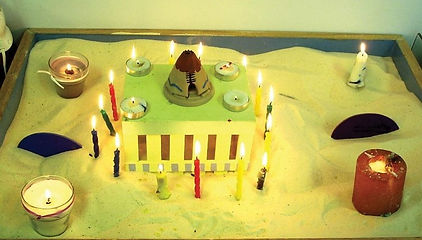
THE PLAY THERAPY STUDIO
of Albuquerque
Karen Wheeler, LCSW, RPT-S, CST-T
THE PLAY THERAPY STUDIO
of Albuquerque
Karen Wheeler, LCSW, RPT-S, CST-T
Licensed Clinical Social Worker
Registered Play Therapist Supervisor
Sandplay Teaching Member
910-232-5615
Play Therapy
Play Therapy
Play therapy can be used to express troubling thoughts or feelings when verbal language fails us. Toys or miniature figures serve as words, and play serves as the language. This is especially effective with young children who do not have the vocabulary to express their fears, memories or feelings. Some play therapy methods, such as Sandplay, have also been found to be very effective with adults.
Play therapy can be used to express troubling thoughts or feelings when verbal language fails us. Toys or miniature figures serve as words, and play serves as the language. This is especially effective with young children who do not have the vocabulary to express their fears, memories or feelings. Some play therapy methods, such as Sandplay, have also been found to be very effective with adults.
The Association for Play Therapy defines play therapy as "the systematic use of a theoretical process wherein trained play therapists use the therapeutic powers of play to help clients prevent or resolve psychosocial difficulties and achieve optimal growth and development."
The Association for Play Therapy defines play therapy as "the systematic use of a theoretical process wherein trained play therapists use the therapeutic powers of play to help clients prevent or resolve psychosocial difficulties and achieve optimal growth and development."
Each type of play therapy is designed to assist different problems and clients. In some cases, the client chooses the activities. In others, the therapist will direct specific activities designed to teach the client particular skills.
Play Therapy is an accepted form of treatment for many issues. These include: Depression, Anger, Anxiety, Grief, Family Conflicts, Divorce, Behavioral Problems, Attachment Issues, Trauma and Loss, Potty-Training, Adoption Issues, Separation Anxiety, Nightmares.
Each type of play therapy is designed to assist different problems and clients. In some cases, the client chooses the activities. In others, the therapist will direct specific activities designed to teach the client particular skills.
Play Therapy is an accepted form of treatment for many issues. These include: Depression, Anger, Anxiety, Grief, Family Conflicts, Divorce, Behavioral Problems, Attachment Issues, Trauma and Loss, Potty-Training, Adoption Issues, Separation Anxiety, Nightmares.

SAND PLAY was developed after WW II to assist children traumatized by their experiences. It uses a wooden tray of sand and miniature toys to create scenes which symbolize events and thoughts, exploring aspects of the world and life experiences.
SAND PLAY was developed after WW II to assist children traumatized by their experiences. It uses a wooden tray of sand and miniature toys to create scenes which symbolize events and thoughts, exploring aspects of the world and life experiences.
WATER TRAY uses smaller plastic trays of water and sand. Clients use the tray to create water scenes, again using small figures. Often children will bathe babies or various figures in the water. This type of play therapy can be effective for children who have been abused or neglected, as well as those suffering from delays in developmental milestones, such as potty-training or separation anxiety.
WATER TRAY uses smaller plastic trays of water and sand. Clients use the tray to create water scenes, again using small figures. Often children will bathe babies or various figures in the water. This type of play therapy can be effective for children who have been abused or neglected, as well as those suffering from delays in developmental milestones, such as potty-training or separation anxiety.

These are two examples of the many kinds of play therapy used by Ms. Wheeler. Ms. Wheeler is a Registered Play Therapist and Supervisor which means she has had hundreds of hours of training and clinical supervision. Her clinical expertise meets the rigorous standards set by the Association for Play Therapy to become a Registered Play Therapist. As a Play Therapy Supervisor she has been supervising and training therapists both locally and nationally since 2000 and served two terms as President of the North Carolina Association for Play Therapy .
These are two examples of the many kinds of play therapy used by Ms. Wheeler. Ms. Wheeler is a Registered Play Therapist and Supervisor which means she has had hundreds of hours of training and clinical supervision. Her clinical expertise meets the rigorous standards set by the Association for Play Therapy to become a Registered Play Therapist. As a Play Therapy Supervisor she has been supervising and training therapists both locally and nationally since 2000 and served two terms as President of the North Carolina Association for Play Therapy .
The Office
The Office
Highwood Park Plaza
3173 Wrightsville Ave.
Wilmington, NC 28403
(corner of Wrightsville and Wilshire)
Phone (910) 251-7950
Fax (910) 251-7980